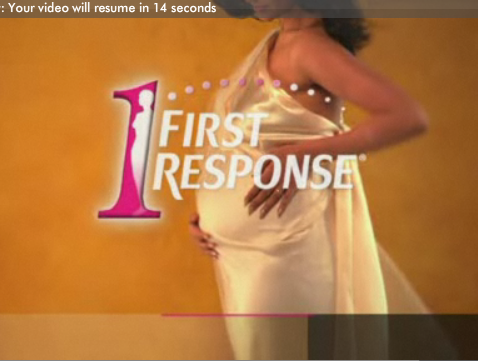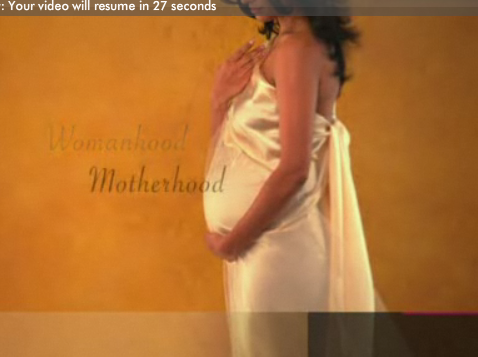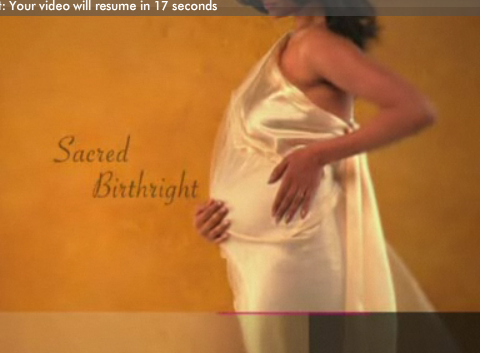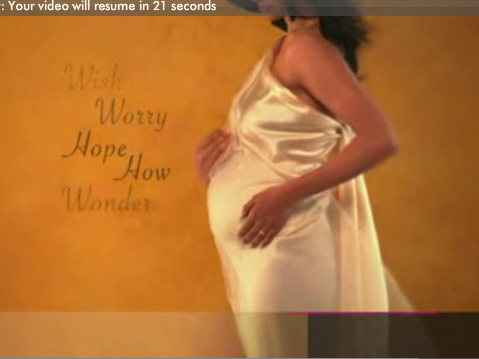Ryan G. alerted us to a commercial for First Response pregnancy fertility tests. He noticed that the commercial cuts off the pregnant mother’s head, turning her into a faceless baby incubator (like in these editorial cartoons and not unrelated to this photography). Ryan writes: “It’s clear what’s most important in this picture.”

While Ryan couldn’t find the commercial to embed, he did take down the narration and sent in some screen shots. Here is the text of the voiceover:
The moment we pass from womanhood to motherhood, we cross a threshold. For many of us, that step is filled with wish and worry, hope and how, wonder and when. Fertility is a woman’s most sacred birthright. For over twenty years, First Response has been there, helping women answer the most important questions of their lives. Now we bring you new help: the First Response fertility test for women.
Ryan offered commentary, so I’ll rely on him. He writes:
…”womanhood” and “motherhood” are presented as two separate things, with motherhood trumping womanhood. I’m assuming this is partly because a woman is not allowed to have a sex drive after she becomes a mother, and we all know that a woman without a sex drive is the higher form of woman.

He continues:
“Fertility is a woman’s most sacred birthright.” God knows the most important thing any woman can contribute to society is being a baby farm. Strangely, I never see Viagra commercials arguing that knocking people up is a man’s most sacred birthright.

“[H]elping women answer the most important questions of their lives.” The most important question in a woman’s life doesn’t involve her own personal needs, but the needs of her children and soon-to-be children.

Finally, Ryan writes:
And of course, there’s no father pictured here, or even a passing mention of one. Why would there be? Conceiving, planning for, and raising a child is exclusively the job–ahem, the “sacred birthright”–of the mother.
Thanks for the excellent and provocative analysis, Ryan!
—————————
Lisa Wade is a professor of sociology at Occidental College. You can follow her on Twitter and Facebook.

Comments 39
Su — July 2, 2009
Please note, however, that the woman pictured has a wedding ring, placing the sex firmly within the context of marriage.
Jennifer — July 2, 2009
Good catch, Su.
I love the comment about motherhood and womanhood being separate because of sexuality, or an absence thereof. I had a conversation recently about the term "MILF" and whether it implies that mothers are not supposed to be "fuckable." There is no term like "DILF" meaning that men who are fathers are no different from men who aren't in terms of "fuckability."
Anon — July 2, 2009
These ads have been all over hulu, and I HATE them. I myself am having trouble conceiving and two friends of mine have had miscarriages this month. So if none of us ever successfully breeds we're "less than" and denied our "sacred birthright?"
Kate — July 2, 2009
Anon, that is exactly what struck me when reading this; it so cruelly ignores the womanhood of those women who are unable to bear children, and also those who make the decision not to do so.
Duckrabbit — July 2, 2009
One of my first thoughts was that "woman's birthright" is a strange concept to invoke here, particularly because it distracts from the near-future birth of the baby by invoking the long-ago birth of the adult woman. It feels almost like a mixed metaphor.
Then I realized that they're probably just pushing as hard as they could on the idea of BIRTH.
anna — July 2, 2009
i dunno, i understand, but to me this commercial is trying to talk about a touchy and sensitive subject for a lot of women (and girls) who are wondering if they are pregnant- remember, some are using the test because they might not be keeping the baby! "helping women answer the most important questions of their lives"-- i think if i were in a spot where i felt sensitive about potential pregnancy, this commercial would be sort of comforting. i think it means no harm. "birthright" is an almost comically odd word to use, though...
pffft — July 2, 2009
Please note that the ad says it's for "the First Response Fertility Test", not Pregnancy Test.
So this is very likely mostly being marketed to women who are very interested in getting pregnant.
Alyssa — July 2, 2009
It's interesting that they use a woman who is noticeably pregnant. Since this is for a fertility test, the woman would be taking the test before she's pregnant; therefore a non-pregnant woman should be pictured. But it seems to be common to use a very pregnant looking woman for fertility and pregnancy test ads even though this is not who would be using their product. Any one have suggestions for why this is so?
Claire — July 2, 2009
Alyssa,
Likely because the advertiser/company wants the viewer to associate the fertility test with successful results - pregnancy.
Meems — July 2, 2009
What I find interesting is that the use of words like "sacred" and "birthright" subtly associates motherhood and family with religion, as though we must procreate because it's some sort of gift from/to God.
Chelsea — July 2, 2009
Pregnancy test commercials have always annoyed because they always show a close-up of the woman's wedding ring.
Trabb's Boy — July 2, 2009
I think the satin-sheet/wedding gown imagery is interesting. They're providing this idea of sex leading to an almost virginal state of pregnancy. You have been a sensuous person, but after the cocoon of pregnancy you will transform into a pure, sacred, sexless Mother.
You would think that, for a product that most women are not familiar with, they would give useful information instead of using the weird image advertising. "Hey, pee on our sticks to see if you're ovulating!" might keep people from assuming these are pregnancy tests.
For a country that is so completely saturated in sex, America has some bizarre prohibition on connecting it with making babies, and I think it does have to do with the idea that mothers are pure and can't be associated with anything dirty. Thanks for the marginalization, advertising world!
Larry C Wilson — July 2, 2009
Perhaps we should just let men have the babies?
Sue — July 2, 2009
I agree that it is odd to show a pregnant woman here. If one is taking the fertility test, they are not going to be already pregnant. And assuming pregnancy is the most desired result, well... What about the women who are taking it in hopes that they are NOT fertile? Or of the women who turn out negative and WANT to be pregnant? It's like a slap in the face. Or a demonstration of how they "SHOULD" be. It seems insulting on a few levels.
pcwhite — July 2, 2009
Also noteworthy...that weird silky white wedding dress, adding to the purity/chastity narrative surrounding the pregnant women.
pcwhite — July 2, 2009
(oops, sorry, Trabb's boy got to that before me.)
Claire — July 2, 2009
Sue,
Why would someone who does NOT want to become pregnant take a fertility test? You'd think they'd...continue using the birth control that they'd been using so far.
ahimsa — July 2, 2009
Fertility is a woman’s most sacred birthright.
Seriously? So, did we enter some kind of weird time warp and travel back to the 1950s?
I know others have pointed out how odious this statement is but I wanted to comment as well. It's just wrong on so many levels - implying that fertility is primarily a woman's responsibility, implying that it's mostly men who care about it (as if some men don't yearn for children, too), raising fertility to the level of something "sacred" or holy, and implying that women who can't have children (or choose not to do so) are somehow lesser than mothers. That's a lot of crap to pack into a single statement.
Titanis walleri — July 2, 2009
"Why would someone who does NOT want to become pregnant take a fertility test? You’d think they’d…continue using the birth control that they’d been using so far."
Birth control *can* fail, you know...
Christie — July 3, 2009
"there’s no father pictured here, or even a passing mention of one. "
There may be no father mentioned or pictured- but she is definitely showing off her wedding ring! I've also noticed that in commercials for condoms, lubes, anything sexual, they always show wedding ring.
Muriel Minnie Mae — July 3, 2009
Claire asked Why would someone who does NOT want to become pregnant take a fertility test? You’d think they’d…continue using the birth control that they’d been using so far.
Some women use fertility tests as a form of birth control. This way they know when *not* to have sex. My mother called it the "rhythm method" I called it "knowing my body and her cycle." I didn't use a fertility test to determine when not to have sex, I learned to relay on my body's signs of ovulation.
half a week’s worth of link posts « Aging Hipster Quarterly — July 4, 2009
[...] http://thesocietypages.org/socimages/2009/07/02/motherhood-as-womens-most-sacred-birthright/ [...]
Penny — July 4, 2009
"Why would someone who does NOT want to become pregnant take a fertility test? You’d think they’d…continue using the birth control that they’d been using so far."
Knowing where you are in your cycle is useful for a lot of reasons, not just fertility/contraception planning. Like Muriel Minnie Mae says, you can learn to read your body's own signals of ovulation, and more women should--it's your body, so learn how it works, I figure. But for women who can't or won't or haven't done that (yet), a fertility testing kit might be a helpful alternative.
Lianne — July 4, 2009
To me, this seems like one big over-analysis. I respect women who choose not to have babies; that's all fine and dandy. However, it seems like this idea has escalated into a lack of respect for motherhood. Even if you choose not to have kids, maybe you should try respecting the process that continues our species. Some of us still feel it's a beautiful thing to be able to create life.
Meep — July 4, 2009
What's curious to me is that the wedding dress/sheet thing almost looks like a (pseudo-)toga and the woman is tanned, like it's evoking some weird ancient Greco-Roman cult of Hestia sort of vibes. (The yellowy tone of the ad is also relevant.) I can't put my finger on it, exactly, but it feels almost like it's trying to call upon the sort of sacred mother (obviously), but of ancient/"mystical" traditions.
Lianne, I don't think anyone here is disrespecting mothers or motherhood, just calling attention to the fact that ads like this (and the cultural climate that produces them) disrespects women who can't or don't want to have children, as though our womanhood is "less than" the woman/motherhood of women who choose and are able to have children.
yikes — July 4, 2009
Those last two sentences of Lianne's don't really foster a feeling that I, a childless woman fast departing child-bearing years, am respected.
Particularly that last one. Ouch.
lizrd — July 5, 2009
I don't really have much more to contribute, but ryan and everyone's analysis of this is totally dead on. These first response commericials irk me as much as the repHresh commercials do.
The Nerd — July 6, 2009
I am reminded of 1 Timothy 2:15 - "However, women will be saved by having children, if they continue to have faith, love, and holiness, along with good judgment." Because of this, I am certain that there are a good many Biblical literalists who believe in the message of this firtility ad.
veeMachi — July 6, 2009
In all fairness, these adds are targeted toward women trying to get pregnant, many of whom share the mentality espoused by this video.
It's also worth noting that the point of the ad isn't to make women associate themselves to the pregnant woman on screen, but to picture themselves as the woman on the screen. That's why head is removed. Impersonalization makes it easier for the audience to picture themselves on screen as opposed to someone else.
Vibhor — July 6, 2009
I am a male feminist (though, I am not sure if I can call myself one, since I have not done anything useful yet. I am in the process of writing a book).
Every time I see something, somehow, I manage to twist it up and curse it to hell because of its apparent sexism. I think it's going a little far...what I'm doing.
And my opinion is that this can be applicable to every feminist. Things can always be seen in another light, as this advertisement. If I had watched it, my first thought would have been "F*** the creators of this"
But, as others have posted, there are other ways with which we can view this advertisement, perhaps with more forgiveness and benefit of the doubt?
Instead of attacking things like this, I think feminists (in general) should do something like educate all people (especially younger girls) about the sorts of brainwashing and sexism that is taking place, and to encourage those people to take a stand against it.
I'm young and inexperienced. Email me if you want to comment and share ideas.
vibhor.kumar.school@gmail.com
Sally — August 16, 2009
They do the same thing to fat people. Watch the B-roll of any "obesity epidemic" news stories. All bodies, not faces.
Mol — November 29, 2009
Sally I think that is to give respect to people who've been filmed unaware they do that on the news for a lot of people.. & especially if it's an obese epidemic clip I dont' think they want to reveal their faces for that..
Mol — November 29, 2009
I am in love with your brilliant lucid - forward thinking site-- ..
WOW reading reading & spot on as far as this advert- yes!
We need A LOT more media skepticism- also I think a great way to ensure freedom of speech but crack down on the violence etc- in porn is it's a media just like anything else- or the news, why not analyze it purely as the media it is & make similar observations?? Honestly!=- what could be more effective in facing the truth, raising awareness & looking into the deeper meanings of our taboos?
& also all the issues of voyeurism & our dangerous obsession with it & also in the context of mirror neurons!
I would LOVE to see this happen-.. Choose a film & let's dissect!
Reut — April 7, 2011
I think the analysis may be exaggerated.
I think the woman's being headless may serve many purposes- one (as was mentioned earlier) to make the targeted women (those trying to get pregnant) able to picture themselves in that position, but also it disguises the woman's gender.
Also, the decision to have (or to not have) a child, and if yes- when to do it, is in-fact one that changes the woman's life, or at least determines much of it's course. In this respect I don't think the advertisers are not being appropriate.
Lastly, I think if anything, this add IS respectful of women who are trying to get pregnant. I don't think it is being disrespectful toward those who aren't.
I don't see where the motherhood=sexless womanhood is coming from, but I don't think it is coming from this add.
Also, just because the add marks fertility as "a woman's most sacred birthright" does not imply that it is her most important role in society- it is HER RIGHT. She get's to choose. This doesn't sound like an observation telling her what she needs to do about it, but offers assistance in the case she chooses to try and have a child
another thing about "helping to answer a woman's most important question"- it is all about the woman's needs. This add is not about parenting guidance books or toys- it's about women who feel a need in having a child. It is a biological, emotional, sometimes almost physical needs that many (albeit not all) women feel.
And yes, Ryan, there doen't need to be a father in the picture for a woman to decide that she wants a baby. She can plan and execute without a constant male figure in her life! For example if she has a female partner, or no partner at all!
The fact that the woman in the add is visibly wearing a wedding ring implies that that is not the intention of the advertisers, but childbearing is the woman's decision. Not the father's, not any other person's. It is hers
J1212 — February 3, 2012
Interesting. The funny thing is, I was the stylist on this commercial--draping the fabric over the prosthetic belly, shopping for the actresses in the spot. I must've been far too busy making sure it all looked good, because I didn't really notice the condescending tone. And I am a woman who --although it is my "sacred birthright" hasn't had the opportunity to have children. Hmm.
Eian Still — September 13, 2024
I Saw This Commercial On My Dad’s New Sharp Aquos HDTV In The Living Room When I Was
Eian Still — September 13, 2024
I Saw This Commercial On CMT HD on My Dad’s Sharp Aquos HDTV In The Living Room When I Was 4 Years Old & A Big Projection TV With The Paul Finebaum Show on SEC Network Showing On At Buffalo Wild Wings In Findlay Ohio
Eian Chad Still — October 26, 2025
I Saw This Commercial on CMT HD on My Dad's 42" VIZIO HDTV In The Living Room When I Was 4 Years Old In 2009 & On Sunday April 24, 2016 Me & My Parents Were Sitting In A Booth Looking At A Big Projection TV With SEC Now on SEC Network Showing On At Buffalo Wild Wings in Findlay OH